| Trouble viewing this email? Read it online. |

| November 8, 2024 | Submit a Note |
 The College of Arts and Sciences and Campus Ministry Synod on Synodality delegation in Rome last month (L-R): Caroline Okello (GPPM Student), Lynne Lukenbill MA '13 (Pastoral Ministries), Janice Thornburg MA '12 (Pastoral Ministries), Amy Cooprider (GPPM Student), Cristina Hernandez MA '24 (Pastoral Ministries), Elyse Raby (GPPM, Religious Studies), Asia Chan '25 (Psychology), Charlie Olsen '26 (Mechanical Engineering). With students from the JST-SCU, a group of undergraduate and graduate students, along with faculty and staff from the Graduate Program in Pastoral Ministries (GPPM), traveled to Rome for a weeklong Synodality pilgrimage. The pilgrimage provided opportunities for students to engage with Synod delegates, experience Rome, learn about the Synodal process, and contemplate how Synodality might transform the SCU community and our local ecclesial communities. Events included a General Audience with Pope Francis, a meeting with Synod leads in the Paul VI Hall, where the Synod deliberations took place, teach-ins on synodality and the future of the church, and numerous other events.
Today I write to acknowledge that many in our community are left anxious and frustrated by this week’s election results. People will wonder about the rule of law in the US, civil liberties, the role of truth in political life, and the nature of morality in our country’s governance. While it may seem that these issues will only be affected by powerful people inside the DC Beltway, we at a Jesuit liberal arts university have a role to play, as we always have. We are teacher-scholars striving to embody a culture of care, dialogue and discovery. We do this best by embracing the liberal arts modes of inquiry and critical examination. As William Halleran, at William and Mary, put it about 15 years ago, the value of a liberal arts education helps to cultivate citizens who are tremendously valuable to society. By that he means …people who can think broadly, communicate effectively, and work collaboratively, who can put information in context, not simply synthesize data, who can approach differences of opinion sympathetically, not insist their views alone have merit, and who identify and test assumptions and want evidence to support conclusions; in sum, those who have learned how to think critically and crisply about ideas and their complexities and who can bring creativity and flexibility to a world of relentless change. I see our College community shaping our students in these ways every year, for which I am especially grateful today. I leave you with a poem by the R&B singer Jill Scott. In solidarity, Daniel I Will WriteBy Jill Scott
I will write Highlights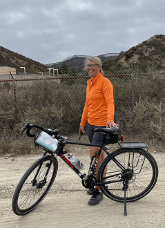
Image: Virginia arriving at the Mexican border, with border wall as backdrop.

With particular sensitivity, she explores his spirituality, personality, and friendships, especially with Rutilio Grande S.J. of El Salvador. Ana María presents a compelling picture of Romero’s life as the foundation for understanding his relation to Catholic social teaching. Ana María, a native of El Salvador, not only had the privilege of meeting Archbishop Romero but also in the course of her research, discovered her family connection to Fr. Grande.
Elsa Chen (Political Science) has received a $425,000 research grant from the Clean Slate Initiative for "Impact and Awareness of Clean Slate Policy: A Longitudinal Multistate Investigation," a two-year mixed-methods study studying automated criminal records expungement in 11 states. She will be working with Ericka Adams (San Jose State University), Sarah Lageson (Northeastern University), and a fabulous team of undergraduate and graduate research assistants from all three institutions.
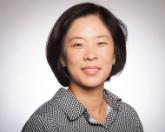
Grace Stokes (Chemistry and Biochemistry) is the corresponding author on a Nature Computational Science correspondence that highlights an interdisciplinary faculty network she helped establish in 2019. This faculty network supports instructors' individual efforts to integrate Python coding into their science courses. One of the faculty training workshops described in the article was held at Santa Clara University in January 2023. The group's current and upcoming activities are described in this Nature.com article.
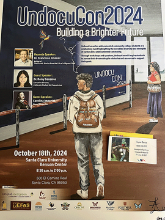
Francisco Jiménez (Modern Languages and Literatures, Emeritus) was the keynote speaker at Visa Headquarters as part of their program to celebrate National Hispanic Heritage Month. The event was sponsored by the Peninsula College Fund, which provides scholarships to first-generation college bound students. He was also a special guest speaker for the Santa Clara City Library Comic Con 2024 event at the Central Park Library on October 12. His presentation was on “The process for transforming The Circuit into a graphic novel.” In addition, he was the keynote speaker at the 2nd annual Undocumented Student Conference for local Community Colleges hosted by SCU on October 18. Over 250 students, teachers, and staff attended.
Jimia Boutouba (Modern Languages and Literatures) was a guest speaker at Sidi Mohamed Ben Abdellah University (USMBA) in Morocco, where she presented her current research on the historical processes that have linked North Africa, Asia and France since the First Vietnam War in which over 120,000 Maghrebi soldiers fought in the French army. Organized and moderated by Said Chemlal, Professor of English in the USMBA College of Arts and Humanities, the talk opened with introductory remarks by Prof. Mohamed Moubtassime, Dean of the USMBA College of Arts & Humanities. Jimia engaged USMBA faculty, staff, M.A. graduate students and Ph.D. candidates in cross-cultural conversations on issues of postcolonial legacies, memorialization, displaced populations, and the role of higher education in addressing global inequities. As part of Jimia’s globally engaged scholarship, this invited talk was an opportunity to further her research and cultivate partnerships and networks through a culturally and contextually collaborative approach that aligns with the University 2030 strategic priorities. Following her visit, Jimia’s expertise has been solicited by USMBA graduate students whose work intersects with her research interests. She is currently advising 2 Ph.D. candidates on their doctoral theses; she is also aspiring to build other opportunities that bridge SCU and USMBA through joint research projects, exchange and/or internship opportunities for SCU students.
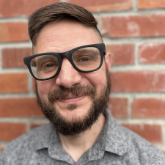
Eugene Schlesinger (Religious Studies) published "Sacraments of Initiation as 'Proof of Concept' for Bernard Lonergan's 'Four-Point Hypothesis'" in New Blackfriars. Abstract: This essay endeavors a correlation between Bernard Lonergan’s ‘four-point hypothesis’ – a theological proposal integrating trinitarian theology and the supernatural order of ‘created grace’ – and the sacraments of initiation. The same formal structure that Lonergan discerned in the experience of grace, itself a means of participation in the life of the Trinity, is replicated in the sacramental reception of that grace in those ritual acts whereby one is made a Christian. This at once serves as a ‘proof of concept’, lending credence to the Lonerganian proposal, and provides a speculative framework for understanding how it is that the sacraments introduce Christians into the divine life.
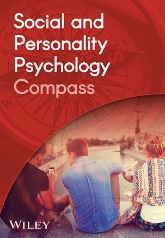
Giselle Laiduc (Psychology) and her co-author and collaborator, Rebecca Covarrubias (UC Santa Cruz) published a paper titled "Paradoxes, uncertainty, and resistance: A psychology of meaning‐making at the margins" in Social and Personality Psychology Compass. The paper examines how students navigate their college transition, especially in moments of struggle, by focusing on three key motivations for meaning-making: the need to understand, self-integrity, and belonging. It introduces the concept of paradoxes that shape these motivations, particularly for marginalized students. Drawing on Gloria Anzaldúa's concept of nepantla—the state of being in-between, navigating conflicting identities and cultures—the authors offer new insights and directions for psychological research on student transitions.
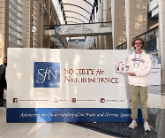
Patti Simone (Neuroscience) attended the Society for Neuroscience convention in Chicago in October to showcase SCU's peer advising program for Neuroscience majors. The posters and talks were exceptional and a highlight was seeing Neuroscience major, Collin Licharz '25 (Neuroscience, Biology) present his research from Laura Cocas's lab. Image: Senior neuroscience major Collin Licharz at SfN 2024.
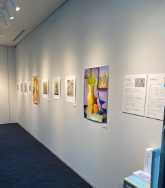
Kelly Detweiler (Art and Art History) exhibited his work in Sapporo, Japan, with Japanese artist Asuka Kunimatsu from October 2-14. The Artist Bank Exhibit was on display at The Flower Gallery at the Hokkaido Bank Building in the center of Sapporo. The exhibit was the latest in a 35-year relationship between the artists of Hokkaido and Santa Clara University. Over the years there have been 13 exhibits either in Japan or in Santa Clara and San Jose in this long cultural exchange. Many former Santa Clara faculty participated in some of the previous group exhibits including David Pace, Susan Felter and Don Fritz, as well as Santa Clara alumnus Luke Bartels '96 (Art).
Takeshi Moro (Art and Art History) is exhibiting his historic Japanese American bonsai photographs at Studio 540 in Cedarville, California. October 4 through November 15, 2024. Curated by Lawrence Rinder, former Director of Berkeley Art Museum and curator of the 2002 Whitney Biennial. It is a two-person exhibition with Richard Mackey’s ceramic Moon Jars and Moro’s bonsai photographs in conversation with one another.

Andrew Schatz ’26 (Environmental Science), Emily Arias ’24 (Biology), and Soondree Kliefoth ’23 (Biology) with Janice Edgerly-Rooks (Biology) co-authored a journal article entitled “A history of susceptibility to parasites and divergence in solitary, gregarious and agonistic behaviors of embiopterans.” The report, appearing in Environmental Entomology, demonstrated that even though embiopteran species are known for their social tendencies, two focal species showed repulsion. The research team filmed multiple replicates of two individuals interacting during 10-minute trials in arenas in the laboratory. Dramatic acts of jolt, bolt and run away were common, yielding the now famous phenomenon of “social distancing.” The hypothesis that behavior helps them avoid contact with internal parasites gained support given that it can be transmitted from one insect to the next. A third species, clear of parasites, was tested for comparison. Those individuals displayed behaviors typical for Embioptera: sitting close inside silk tubes that they fashioned together. In multiple-day trials where individuals were housed in mini habitats, those susceptible to parasitism settled apart from one another; again, a behavior that reduces risk. The students’ work was supported: a DeNardo Scholarship for Emily and 2FURS (previously FSRAP) for Andrew and Soondree. Because the parasite is not well known, research continues in collaboration with Leilani Miller (Biology) and student researchers Lauren Fuller ’25 (Biology) and Aidan Kaneski ’25 (Biology).
Chris Bacon (Environmental Studies and Sciences) participated in The International Transdisciplinary Biennial on Environmental Justice at Lassalle-Institute (Switzerland) from August 25-29, 2024. The conference, which had a competitive abstract submission process, included experts in academia, politics, business, and social development from over 20 countries and focused on making hope tangible by expanding transdisciplinary cooperation in socio-ecological transformation. It is one of the largest Jesuit higher education conferences in Europe. Chris Bacon, with co-author Michael Schuck (Loyola University Chicago), gave a paper that drew on their work as co-chairs of the Association for Jesuit Colleges and University’s Laudato Si’ Commission to analyze collective achievements as well as the obstacles and opportunities for using Integral Ecology to accelerate cross-institutional cooperation and transformations for sustainability and environmental justice. Chris was also invited to chair a panel featuring speakers from the Pontifical Javierian University in Colombia and Jesuit Worldwide Learning. This work was also done in collaboration with SCU's Environmental Justice and Common Good Initiative, and with support from the Ignatian Center for Jesuit Education.
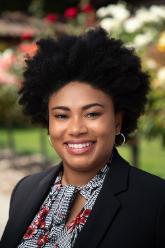
The American Physics Society (APS) Far West Section meeting was held at Cal Poly Humboldt on October 25-26. Over 100 students and researchers shared their work at this event. Five of our physics and engineering physics majors were in attendance.
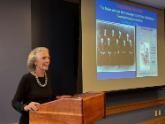
Image: Nancy Unger speaks at Columbia University.

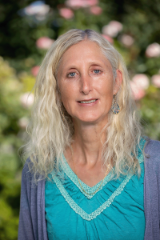
Iris Stewart-Frey (Environmental Studies and Sciences, Environmental Justice and the Common Good Initiative) gave a keynote presentation on 'Community-academic partnerships to support climate adaptation to recent and future hydroclimatic shifts' at the 4th Global Congress on Climate Change (GCCC-2024) in Lisbon in September. In her address, she highlighted the possibilities of connecting the work of the climate science community to the efforts of strengthening climate resilience on the ground, especially in the Global South. She also called on the responsibility of the climate science community to provide the resources for science-based decision-making on local scales, using the collaboration around the NicaAgua app at SCU as a case study. For more information on the project, visit the Water and Climate Justice Lab website.
|
| College of Arts and Sciences |
Questions? Contact Sandy Boyer |
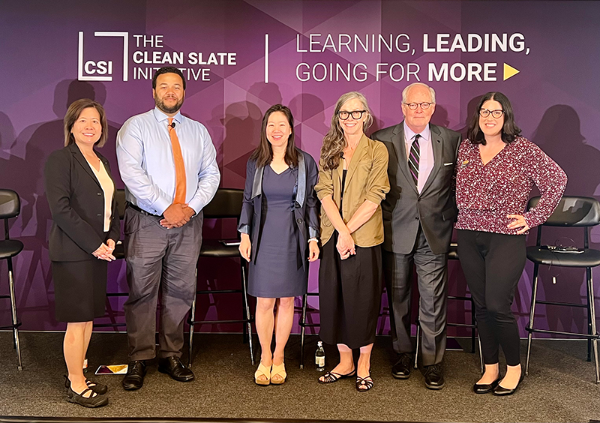 Elsa Chen (far left) at the Clean Slate Initiative national convening in June 2024, where she gave a presentation titled "Automated Criminal Record Expungement: A Strategic Framework for Successful Policy Change."
Elsa Chen (far left) at the Clean Slate Initiative national convening in June 2024, where she gave a presentation titled "Automated Criminal Record Expungement: A Strategic Framework for Successful Policy Change."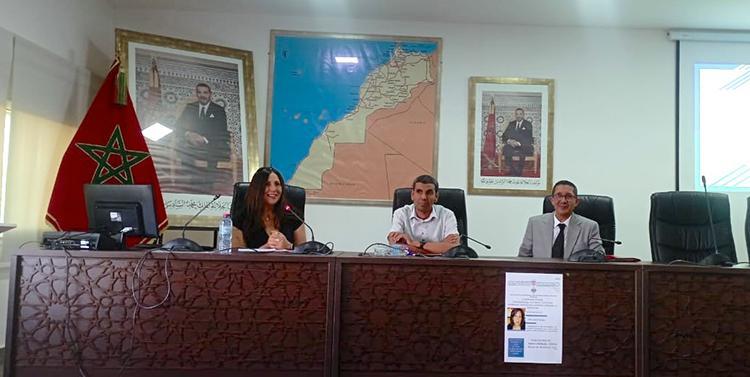 (L-R): Jimia Boutouba, Mohamed Moubtassime, and Said Chemlal.
(L-R): Jimia Boutouba, Mohamed Moubtassime, and Said Chemlal.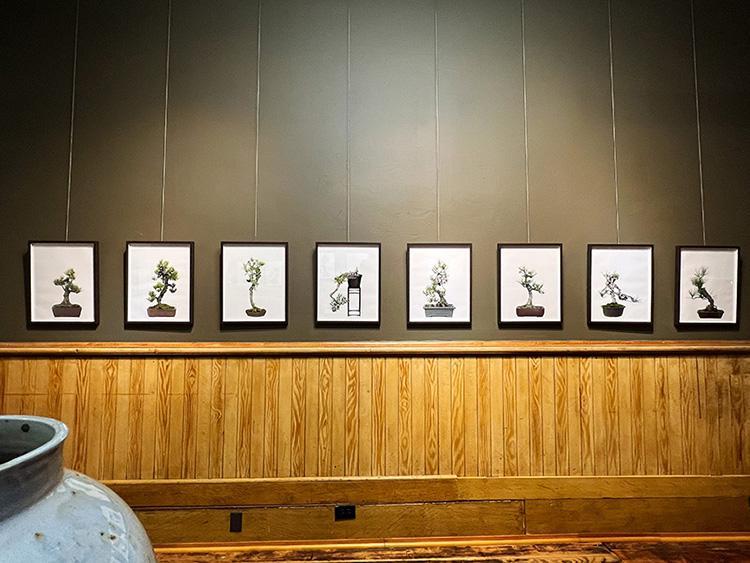
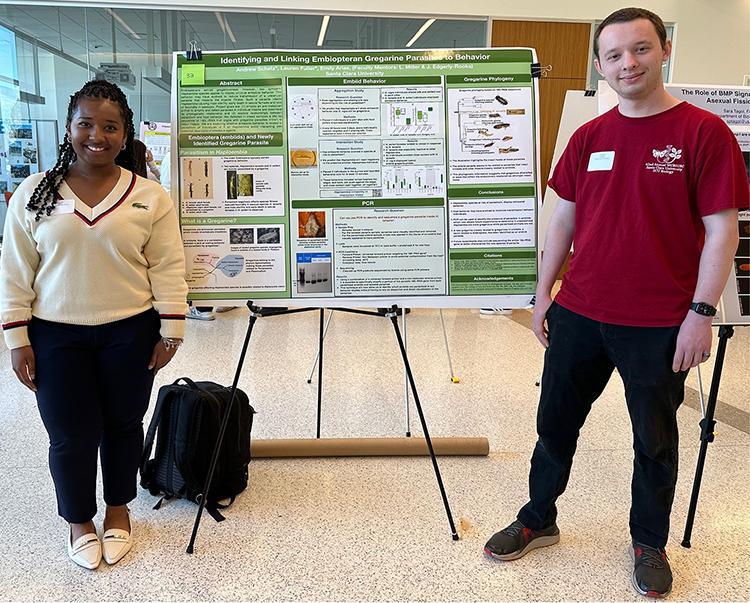 Co-author Andrew Schatz (right) presenting the research results that were featured in the journal article at the West Coast Biological Sciences Undergraduate Research Conference held at SCU in April 2024. Lauren Fuller (left) is continuing the research with support from an ALZA scholarship.
Co-author Andrew Schatz (right) presenting the research results that were featured in the journal article at the West Coast Biological Sciences Undergraduate Research Conference held at SCU in April 2024. Lauren Fuller (left) is continuing the research with support from an ALZA scholarship. Conference participants at the Jesuit Lassalle-Institut, Zug/Zürich (CH).
Conference participants at the Jesuit Lassalle-Institut, Zug/Zürich (CH).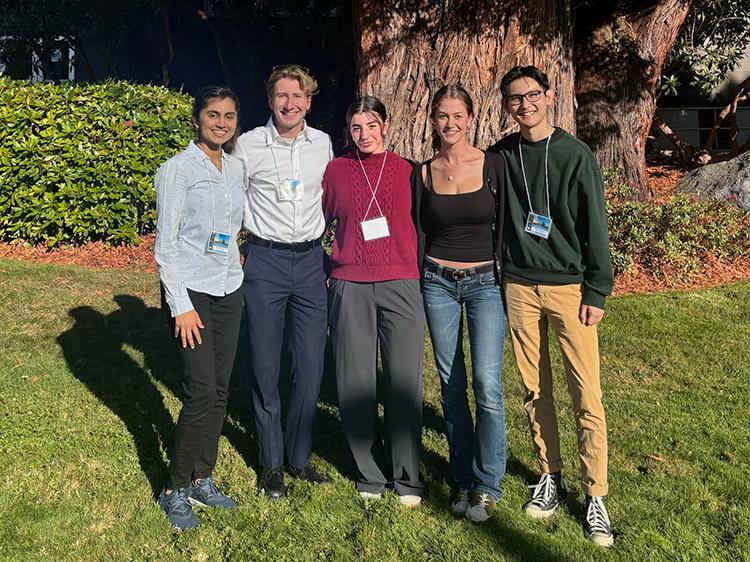 (L-R) Renee Chapla ’26 (Engineering Physics), Leo Illing ’25 (Physics, Mathematics), Alana Harrison '27 (Engineering Physics), Emily Scott ’26 (Physics), Riley Carpenter ’25 (Engineering Physics).
(L-R) Renee Chapla ’26 (Engineering Physics), Leo Illing ’25 (Physics, Mathematics), Alana Harrison '27 (Engineering Physics), Emily Scott ’26 (Physics), Riley Carpenter ’25 (Engineering Physics).